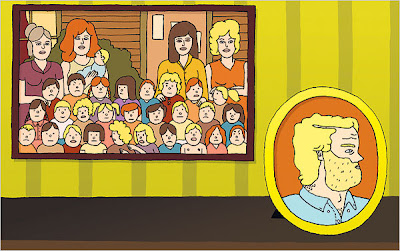 |
| Illustration by Jordan Awan, via |
Published: 2010
It's about: Bumbling, apologetic Golden Richards goes to great lengths to avoid his four unhappy wives and their out-of-control horde of children. He spends more and more time out of state, overseeing the construction of what his family believes is a senior living center. The building is, in actuality, a fancy new brothel owned by a slimy, threatening semi-mobster. Without meaning to, Golden falls for the boss man's wife. He gets into very hot water at work as his family crumbles in his absence.
The narrative is told from the alternating points of view of Golden, his fourth wife Trish, and one of his sons, Rusty.
I thought: Huh. Well. Sorta having trouble organizing my thoughts here. I really disliked the first half of this book; I had to make myself listen to it. I found all the characters interesting and unusual, but also pathetic and tiresome. The story, such as it was, didn't seem to have much continuity or forward momentum, and I had trouble relating the characters' different points of view to one another. And I just don't share the author's sense of humor. There are LOTS of bodily functions in this book: people having to pee, sneezing, passing gas, hiding erections, etc.
But then, out of nowhere, comes this masterful section about the testing of an atomic bomb called, in the book, "Roy." (Possibly based off of "Dirty Harry") The personification of the bomb itself, the weaving together of witness/victim stories (including some of the main characters in The Lonely Polygamist), the amazing deftness of the descriptions and the storytelling... I don't often feel awe when I'm reading, but I did here. This chapter blew me away. It would make a beautiful story in itself, and it changed my attitude about the rest of the book.
I can't say I loved the second half of the book. Udall never let up with the bodily functions, and Golden in particular failed to move me at all. But as actual tragedies enter the story, the Richards family becomes a cohesive unit, fueled by shared motivations and a common past. I found myself thinking about the nature of family, and the way trauma can pull people together in subtle (and not so subtle) ways. So, overall, I can't help but feel that the quality of The Lonely Polygamist is uneven, and while Brady Udall is unarguably an excellent writer with a smart, snappy style, he doesn't quite live up to his potential with this particular book.
 Oh! Almost forgot to mention the reader, David Aaron Baker. He did a great job- perfectly natural inflection and pausing, amusing but not obnoxious voice differentiation, all the things you want in a good reader. And it's a good thing I enjoyed him, since this would have been a long 23 hours of listening with a bad reader. Baker could have used a few pointers about pronunciation- he's the first person I've ever heard use a hard "ch" in the word "chasm." And then there are the Southern Utah towns: Hurricane, Kanab. To be fair, how could anyone know that the town isn't pronounced like the natural disaster? So I can't really fault him to much for that. I liked him, and would like to listen to him read more.
Oh! Almost forgot to mention the reader, David Aaron Baker. He did a great job- perfectly natural inflection and pausing, amusing but not obnoxious voice differentiation, all the things you want in a good reader. And it's a good thing I enjoyed him, since this would have been a long 23 hours of listening with a bad reader. Baker could have used a few pointers about pronunciation- he's the first person I've ever heard use a hard "ch" in the word "chasm." And then there are the Southern Utah towns: Hurricane, Kanab. To be fair, how could anyone know that the town isn't pronounced like the natural disaster? So I can't really fault him to much for that. I liked him, and would like to listen to him read more.Verdict: In Between. (Ingrid stuck it on the shelf, though, so you may have to check it out to decide for yourself!)
Reading Recommendations: This one might not grab your interest from the get-go. Stick with it to get to the Atomic Fallout chapter, and you'll be good to go from there on out.
Warnings: Quite a bit of language, fairly vivid violence, some sex, and the bodily functions I mentioned. It's about fundamentalist Mormons, but it's probably too dirty to appeal to actual fundamentalists of any stripe.
What I'm listening to next: Bossypants by Tina Fey








